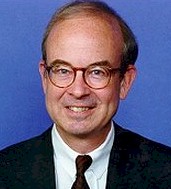Re: CableLabs POD-Host Interface License Agreement.
Date: March 21, 2002.
Source: Office of Rep. Boucher.

| Letter from Rep. Rick Boucher (D-VA) to FCC
Chairman Michael Powell. Re: CableLabs POD-Host Interface License Agreement. Date: March 21, 2002. Source: Office of Rep. Boucher. |
 |
|
|
|
||
March 21, 2002
The Honorable Michael K. Powell
Chairman
Federal Communications Commission
445 Twelth Street SW
Washington, D.C. 20554
Dear Mr. Chairman:
I am writing to express my disappointment with the Commission’s decision to keep secret the license agreement that a manufacturer must sign in order to bring to market a competitive “navigation device” (such as a cable-ready digital television receiver or a set top box) that can connect directly to a cable system.
On May 11, 2001, as part our shared goal of speeding the introduction of new digital television products to market for the benefit of consumers, I urged you to publish the CableLabs “POD-Host Interface License Agreement” (PHILA license) so that all interested parties, including companies that desire to manufacture navigation devices, may learn of its terms. In your June 14th response, you declined to do so, indicating that the Commission “has a mechanism in place to review aspects of any proposed license agreement, including PHILA, that arguably implicate Commission rules that are designed to promote the commercial availability of navigation devices.” You noted that the Commission has not received any petitions pursuant to this procedure alleging that the PHILA license violates any of the Commission’s navigation device rules.
Subsequent to your letter, however, CableLabs engaged a law firm to take over its negotiations with potential device manufacturers. The firm has imposed a requirement that only companies willing to sign a non-disclosure agreement (NDA) be able to review the terms of the license. I am advised that one of the conditions of the NDA is that the person signing it may not publicly disclose or discuss its contents in any fashion, including any disclosure that would accompany a petition to your agency. As students of Joseph Heller would appreciate, the industry is being told its only remedy is to complain publicly while still keeping the offered terms secret. Given this effective gag order, it should come as no surprise that the Commission has not received any petitions pursuant to the procedure outlined in your letter.
Even if the NDA were lifted today, shifts in entertainment industry positions with respect to digital copyright issues, and requests for Congressional action, have made it vital that the Commission acknowledge and move forward in its Congressionally mandated responsibility to oversee the exercise of the power it has delegated to CableLabs. This is no ordinary license; it has clear public policy consequences, with direct effect on consumers. Congress needs to know whether its previous direction to the Commission with respect to the competitive availability of navigation devices has been carried out appropriately. It is indefensible that a license to implement a public trust, mandated by an act of Congress, be kept “secret.” There is absolutely no public policy justification for this secrecy.
In particular, Congress and consumers deserve to know the potential effect of the license terms. Specifically, they deserve to know whether the PHILA license addresses significant issues which have emerged in recent Congressional testimony and roundtable discussions. First, will content owners or cable companies be able to use “selectable output controls” or extended Copy Control Information (which give system operators the power to select which output could be used on a device) or be able to force “down resolution” of signals as a means of preventing redistribution and restricting copying? Concerns have been raised that the use of selectable output controls and down resolution of signals could preclude consumers from making copies of programs in a manner assured under classic fair use, transferring programs within the home, or viewing programs at their highest degree of resolution. Second, will the license and accompanying specifications include balanced, consumer friendly “encoding rules,” such as those established in section 1201(k) of the Digital Millennium Copyright Act?
I understand that 2.5 million HD-ready displays have been sold to date. Virtually all of these devices receive their signal via analog inputs, and thus could be threatened by the use of selectable output controls and the down resolution of the signal. Implementation of these measures could therefore disappoint millions of unwitting consumers, who have led the digital television transition by making major financial investments in HD-ready receivers and displays.
The only way to know whether these concerns are well-founded is to have the license published for public examination. Publication for public comment will drive parties to take clear positions on public policy issues concerning home viewing and recording and fair treatment of competitive entrants that may be implicated by the license. Such publication will result in clear statements of positions about who supports selectable output controls and the down resolution of signals and why, who opposes their use and why, and whether or not the public interest is served by the Commission approving their use.
The license to implement a public trust, mandated by an act of Congress, should not be covert, nor should the debate about CableLabs’ administration of that trust.
In light of recent discussions concerning selectable output controls, down resolution of signals, and the need for balanced encoding rules, I again strongly urge you to obtain and publish for public comment the most current version of the PHILA license.
Thanking you for your time and attention to this matter, I remain
| Sincerely,
Rick Boucher |
Honorable Kathleen Q. Abernathy
Honorable Michael J. Copps
Honorable Kevin J. Martin
RB/jem